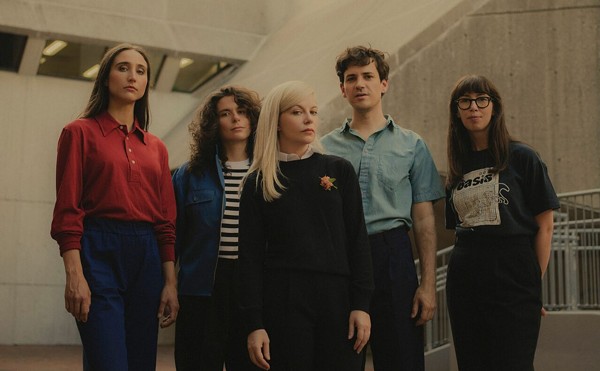Mississippi folk legend Cat-Iron once recorded a song called "Jimmy Bell" — a ballad about a shady preacher who comes to town to save souls for money. He's a firebrand in the pulpit, popular with the sisters and packing his bags for something bigger down the road.
Robert Kidney is not unlike the cool and charismatic Jimmy Bell. Sitting at Akron's Angel Falls Coffee House, Kidney's wearing his signature black attire and talking with brother and fellow pulpiter Jack Kidney about the long history of their blues-rock group 15.60.75 (a.k.a. the Numbers Band), best known for their classic 1976 album Jimmy Bell's Still in Town. These blues brothers don't save souls, but catch their Numbers Band live, and they'll give you a sermon on par with church or theater.
"I've always compared the band to drama," says Robert, hands up, eyes wide, pausing for a moment. "It's like a libretto or like a play or like literature. Behind every song, there's a story. That is what this band is about — meaning. What does it mean? What do the words mean? That's important. And the music is secondary. I've been very blessed to work with great musicians and I have plenty of proof of that. But it's always been about what these words mean."
The Numbers Band have spread the word for 40 years through their distinctive style of drama. The story starts at the Kove in Kent, where the Numbers Band became a local sensation in the 1970s, packing 700-900 fans into a dingy venue to hear their freeform musical fusion. It culminates with their latest album, The Inward City, their best record yet.
"Today we've got two singer-songwriters — brothers — we both write songs," says Robert. "So sometimes [Jack] will be playing the keyboard and I'll be playing guitar, and it's a completely different sound. The next one up I'm playing guitar, and it's a runway train with two horns. It's all these different facets. Someone called us shape-shifters. If you come to see the band, don't expect one sound. You won't get it."
The brothers have always sparked controversy and attention for their aggressive attack on the blues-rock formula — morphing from Ornette Coleman to Johnny Cash, from Muddy Waters to Morphine. The only three constants since the 1970s have been Robert Kidney, Jack Kidney and Terry Hynde (saxophonist and brother to Chrissie Hynde). A parade of musicians has passed through the band, all with intense experiences. Both Jerry Casale (Devo) and Chris Butler (the Waitresses/Tin Huey) were members before they went on to be part of Akron's famous '70s new-wave scene — a phenomenon that passed by the Numbers Band.
"Our music is not pop music," says Robert. "I'm not criticizing pop music, but that was a pop-music phenomenon. Jerry Casale is a friend of mine. We were young men together in the band. I had to put him out of the band because he was creating this dissension, because he had this whole thing he wanted to do. I was like, 'Jerry, why don't you go do something? You're talented, intelligent, go make a band how you want it to be.' And that was Devo."
Yet, of all the promising Akron-Kent groups of the time, the Numbers Band are the only ones still writing great music. Today the five-piece (drummer Frank Casamento and bassist Bill Watson round out the group) is promoting its sixth-full length, 2009's The Inward City. Recorded at the behest of Peru Ubu frontman David Thomas and his longtime artist and designer John Thompson, the Kidney brothers put together nine of their signature rustbelt-blues tunes at Suma Studios, which Thomas produced. The Inward City captures a whole new face of these musical evangelists in the studio — an eclectic array of redemption rock blues ("Thunderhead"), train love songs ("From Me to You") and jazzy beatnik poetry ("The Tellsusourvision").
"It's the best thing we've ever done," says Jack. "We are a live band, and we're still a live band. We're not a studio band. We're very unfamiliar with the mechanics, but they made it really easy. They put a lot of thought into how to record us. They knew what they were going to do before we walked in the door. There were, of course, those tough moments where you're working, but other than that, it was great."











